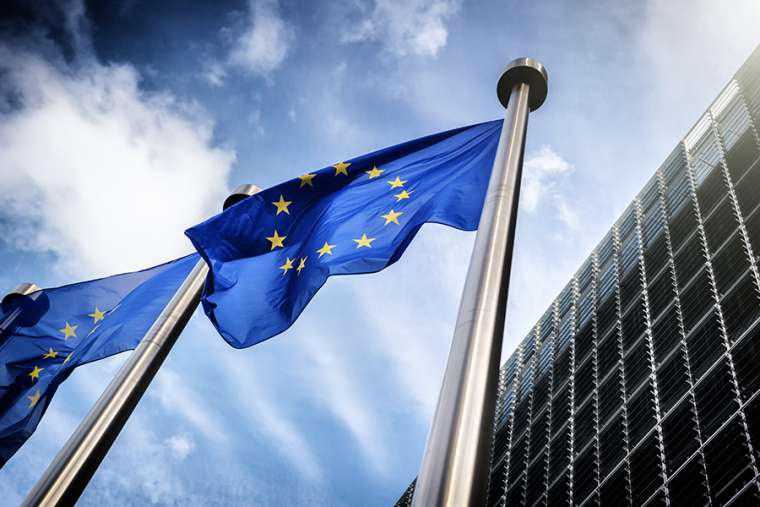Caption: EU flags. Credit: symbiot via Shutterstock.
The European Catholic bishops’ commission urged the European Union this week to commit to deepening solidarity in its pandemic recovery plan.
The bishops issued an 11-page joint proposal in partnership with the ecumenical Conference of European Churches filled with recommendations on the priorities of the German Presidency of the Council of the European Union’s “Together for Europe’s recovery” package.
“The unsettling experience of the coronavirus pandemic has shown to us Europeans that we are not isolated individuals, but persons that need both human relations and to live together with the awareness of interconnectedness … It is necessary to revitalize our sense of solidarity by using and strengthening the possible measures of the EU to fight against the COVID-19 crisis and its consequences for all societies and for every human person,” the joint statement published July 7 said.
“We are strongly committed to developing the European project, our joint aim being a peaceful and prosperous, just, inclusive and sustainable Europe for all,” the Christian leaders stated.
German Chancellor Angela Merket presented the German Presidency’s proposed pandemic recovery plan to the Members of the European Parliament July 9, stating that “Germany is prepared to show extraordinary solidarity” to make Europe’s recovery more sustainable and innovative.
A delegation of the Catholic Commission of the Bishops’ Conferences of the European Union (COMECE) and the ecumenical Conference of European Churches met in the Belgian capital Brussels earlier in the week to discuss the German Presidency’s priorities with Michael Clauss, the Ambassador at the Permanent Representation of Germany to the EU.
The delegation stressed the importance of supporting both immediate economic recovery and a more long-term recovery by amending the current financial framework “in order to cushion the economic and social impact of the COVID-19 pandemic.”
“This is the time for all of us to demonstrate our joint commitment to the European project and to common European values of solidarity and unity, instead of capitulating to fear, extreme nationalism and shortsighted populistic interests,” they urged in the statement.
“Specific attention needs to be given to protecting the most vulnerable in our European societies,” they said. “We need to promote the common good, strengthen the spirit of solidarity and promote a European recovery through ecological, social and contributive justice.”
Among their specific recommendations, the European bishops voiced support for the European Green Deal, calling it “a major step ahead in efforts in order to protect the environment, reduce GHG (greenhouse gas) pollution and in order to achieve a sustainable future.”
The European Green Deal, launched at the end of 2019, provides a roadmap for transforming the EU’s economy so that there will be no net emissions of greenhouse gases from the region by 2050.
“We are convinced that efforts to overcome impacts of the COVID-19 pandemic must not be shaped along the guidelines aiming to return to previous environment damaging production habits and overconsumption levels,” they stated. “The lessons learned from the pandemic need to be taken as an opportunity for correcting mistakes of the past as much as possible.”
“Lessons learned from the COVID-19 pandemics regarding dramatically reduced carbon emissions from transport as a consequence of reduced traveling and new ways of remote working and online meetings need to be analyzed,” they added.
Increased solidarity can also be attained through a reform of Europe’s migration and asylum policies, the bishops explained.
“Christian churches in particular hope that many of those 30,000 which should have been resettled to the EU in 2020 (pledge made at the Global Refugee Forum December 2019) will still arrive in EU member states in the second half of 2020,” they stated.
In particular, they recommended the expansion of the EU’s refugee resettlement capacities, the efforts to prevent the loss of lives in the Mediterranean Sea, and assistance to address the root causes that drive migration.
The bishops called on the EU to set up a permanent mechanism to monitor and report religious persecution in countries outside of the EU and to promote religious freedom and freedom of conscience globally.
“The EU Guidelines on Freedom on Religion or Belief need to be implemented more consistently, and EU needs to put particular attention on promoting freedom of religion or belief in the world — not only as a human right, but also as a strategic dimension for democratic freedom and fostering social peace, justice and reconciliation, and foresee a mechanism to reinforce it outside EU,” they said.
The bishops’ statement offered support for increased use of artificial intelligence within Europe with the caveat that these developments needed to be monitored closely to ensure the protection of human dignity and privacy, including data relating to religious beliefs.
“Progressive digitalization also poses challenges in terms of social justice in Europe. Algorithms are not impartial,” the bishops noted.
The bishops said that any temporary erosion of personal data protection and privacy standards due to the pandemic would need to be eliminated at the earliest possible stage.
“Digitalization in innovation, research and education will be key factors regarding European competitiveness and the ability to lead in the transition to a recovered and socially just post-corona digital age which is rooted in a deep ethical responsibility,” they said.
Social justice, ecological justice, and contributive justice will be key to grounding the European Union’s recovery on “the pillar of justice,” according to the statement.
“As regards social justice, the EU should care about and respect the needs of the most vulnerable in order to ensure social cohesion in Europe, combating poverty and inequalities,” they stated.
“This requires an overall budget that is aligned to the political priorities and values of the EU, so that new hope for Europe can be found in a joint recovery, expressing both a renewed spirit of solidarity as well as an ambition to work for a just future.”

